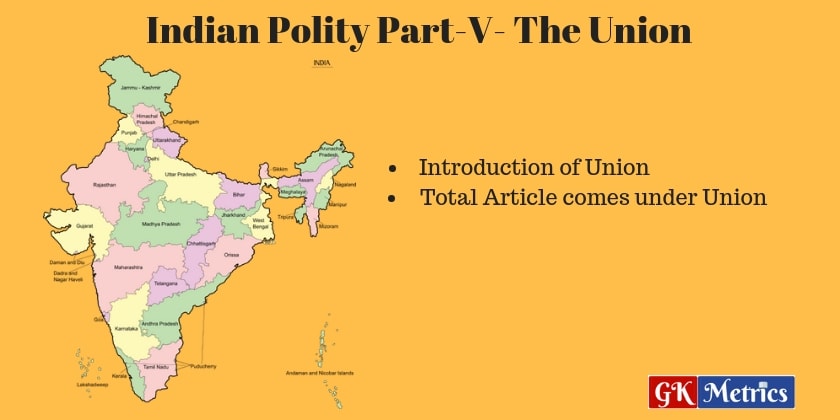Indian Polity Part V-The Union
The Union Government is categories in 5 Chapters. Under part V The Union Article 52 to 151.
1. Executive
2. Parliament
3. Legislature power of a president
4. Union Judiciary
5. Comptroller and Auditor General of India
1. Executive:
The executive is the basic exercising authority and holding responsibility for the governance of a state. The executive executes and enforces a law. The Executive Branch of government is the one that has sole authority and responsibility for the daily administration of the state bureaucracy. The division of power into separate branches of government is central to the Republican idea of the separation of powers. The executive does not pass laws.
A. The President
B. The Vice-President
C. The Prime Minister
D. Council of Minister
E. Attorney-General of India
2. Parliament:
Parliament of India is the supreme legislative body of the Republic of India. The Parliament is made up of the President of India and the House. It is a bicameral legislature means with two houses Rajya Sabha (State Council) and Lok Sabha (House of People).
A. General Article (79-88)
B. Officers of Parliament Article(89-98)
C. Conduct of Business Article(99-100)
D. Disqualifications of members Article(101-104)
E. Powers, Privileges, and Immunities of Parliament and its Members Article(105-106)
F. Legislative Procedure Article(107-111)
G. Procedure in Financial Matters Article(112-117)
H. Procedure Generally Article(118-122)
3. Legal Powers of Presidential Article (123):
The President of India is the Chief of India and the Commander-in-Chief of the Indian Armed Forces. The President in his role as head of the legislature has full powers to summon and prorogue either house of Parliament or to dissolve Lok Sabha.
4. Union Judicial Article (124-147):
Under the Part V of the Constitution, the union is related to the judiciary. The constitution and jurisdiction of the Supreme Court have been explained in detail in 124-147 articles. there may be two branches of Indian judicial first is High Courts in states, the law declared by the Supreme Court shall be binding on all courts within the territory of India (Article 141).
5. Comptroller and Auditor General of India CAG Article (148-151):
The Comptroller and Auditor General (CAG) of India is an authority established by Article 148 of the Constitution of India, which audits all the receipts and expenditure of the Government of India and the State Governments, including those of bodies and authorities substantially financed by the government. The Comptroller and Auditor-General of India is appointed by the President of India

